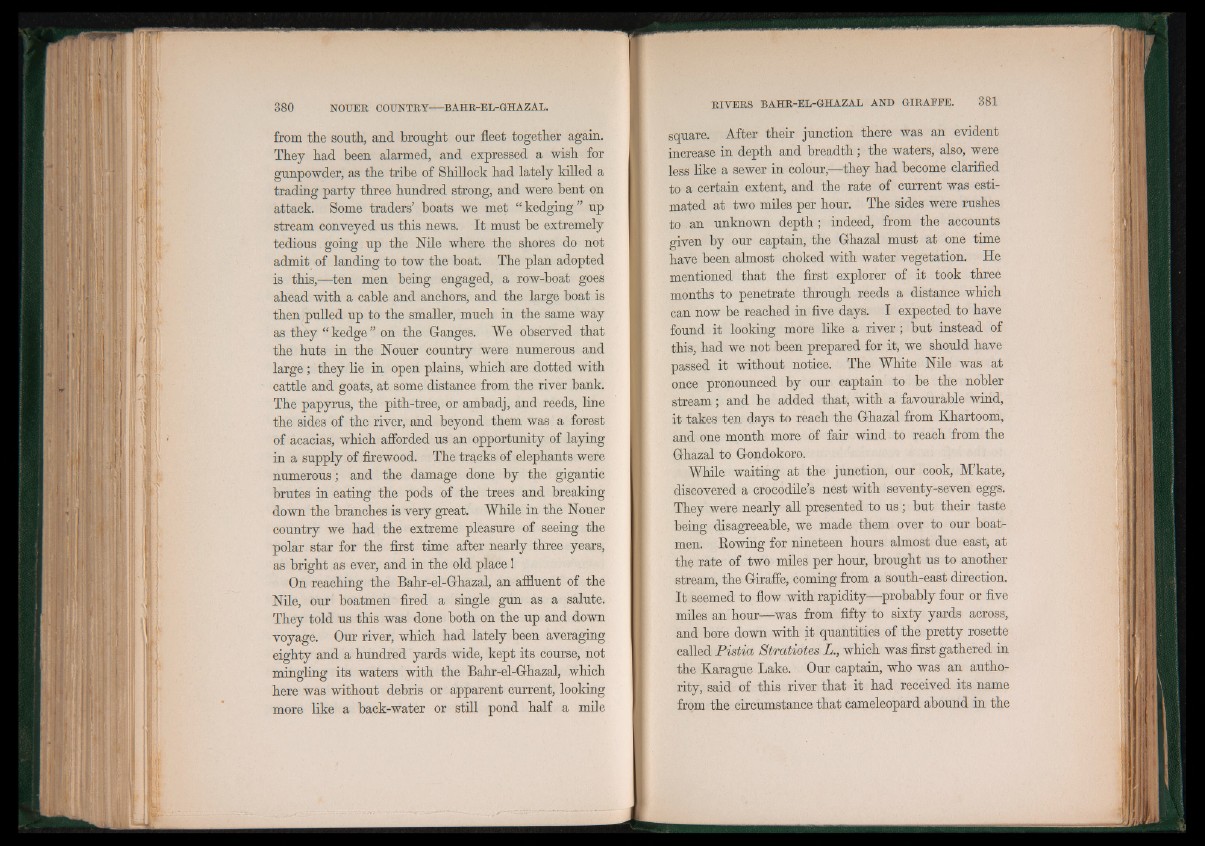
from the south, and brought our fleet together again.
They had been alarmed, and expressed a wish for
gunpowder, as the tribe of Shillock had lately killed a
trading party three hundred strong, and were bent on
attack. Some traders’ boats we met “ kedging” up
stream conveyed us this news. It must be extremely
tedious going up the Nile where the shores do not
admit of landing to tow the boat. The plan adopted
is this,—ten men being engaged, a row-boat goes
ahead with a cable and anchors, and the large boat is
then pulled up to the smaller, much in the same way
as they “ kedge ” on the Ganges. We observed that
the huts in the Nouer country were numerous and
large; they lie in open plains, which are dotted with
cattle and goats, at some distance from the river bank.
The papyrus, the pith-tree, or ambadj, and reeds, line
the sides of the river, and beyond them was a forest
of acacias, which afforded us an opportunity of laying
in a supply of firewood. The tracks of elephants were
numerous; and the damage done by the gigantic
brutes in eating the pods of the trees and breaking
down the branches is very great. While in the Nouer
country we had the extreme pleasure of seeing the
polar star for the first time after nearly three years,
as bright as ever, and in the old place !
On reaching the Bahr-el-Ghazal, an affluent of the
Nile, our boatmen fired a single gun as a salute.
They told us this was done both on the up and down
voyage. Our river, which had lately been averaging
eighty and a hundred yards wide, kept its course, not
m in g lin g its waters with the Bahr-el-Ghazal, which
here was without debris or apparent current, looking
more like a back-water or still pond half a mile
square. After their junction there was an evident
increase in depth and breadth; the waters, also, were
less like a sewer in colour,—they had become clarified
to a certain extent, and the rate of current was estimated
at two miles per hour. The sides were rushes
to an unknown depth ; indeed, from the accounts
given by our captain, the Ghazal must at one time
have been almost choked with water vegetation. He
mentioned that the first explorer of it took three
months to penetrate through reeds a distance which
can now be reached in five days. I expected to have
found it looking more like a river; but instead of
this, had we not been prepared for it, we should have
passed it without notice. The White Nile was at
once pronounced by our captain to be the nobler
stream; and he added that, with a favourable wind,
it takes ten days to reach the Ghazal from Khartoom,
and one month more of fair wind to reach from the
Ghazal to Gondokoro.
While waiting at the junction, our cook, M’kate,
discovered a crocodile’s nest with seventy-seven eggs.
They were nearly all presented to u s ; but their taste
being disagreeable, we made them over to our boatmen.
Bowing for nineteen hours almost due east, at
the rate of two miles per hour, brought us to another
stream, the Giraffe, coming from a south-east direction.
It seemed to flow with rapi dity-^-probably four or five
miles an hour—was from fifty to sixty yards across,
and bore down with it quantities of the pretty rosette
called Pistia Stratiotes L., which was first gathered in
the Karague Lake. Our captain, who was an authority,
said of this river that it had received its name
from the circumstance that cameleopard abound in the